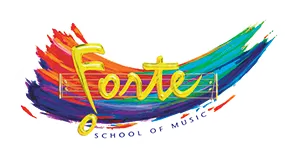Frequently Asked Questions
Are you thinking about starting music lessons at Forte School of music Kent?
We hope this section answers the questions you might have relating to Forte Music School and our classes.
Starting Music Lessons at Forte
When is a good age for my child to start music lessons?
The best time to start learning music is as young as possible! We have children that have moved through the Forte programme from the early days of Jungle Music, who then easily tackle the demands of the keyboard courses when they are 4 and 5 years of age.
The children who start in Jungle music courses are naturally:
- More musical,
- Have a better sense of beat & rhythm,
- Have a better sense of pitch and All the other elements and skills that go to make up music and musicality.
Don't despair if your child is older, now is always a good time to start. If your child is under 10 or 11 years, a Forte music course is the best place to start.
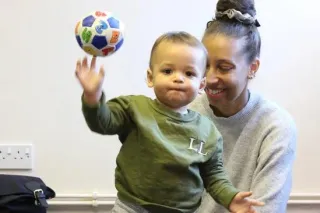
How much practice is required?
It is much more beneficial to practice often and for shorter times than less frequent but for longer times.
- For children, we expect a minimum of 10 minutes at least 3 times a week. This can be stretched out to 20 minutes, 4 to 5 times per week. Remember we still want to keep it fun, and you’ll be surprised how much children learn if they maintain a regular practice schedule. This is helped by our homework practice sheets.
- As the children move past 10 years old, and for adults, you should be practice for 20 to 30 minutes, 4 to 5 times per week.
Just remember to keep practice fun! Try improvisation or just playing songs that interest them.

What instrument is a good one for my child to start learning?
At Forte we generally recommend piano as a good place to start. This is because the notes are easily accessible and each note is easy to play, one key at a time. Where as other instruments may require playing a combination of keys or strings at once. This will also mean more complex hand movements. Also on a piano the notes are visually laid out in order from lowest to highest, making it easier to understand the pitch of the instrument.
Pianos are relatively low upkeep in terms of tuning. Tuning is performed annually by a piano tuner. Electronic pianos or digital pianos do not require any tuning. Best of all, there is no need to worry about daily or frequent tuning that is required by other instruments especially stringed instruments.
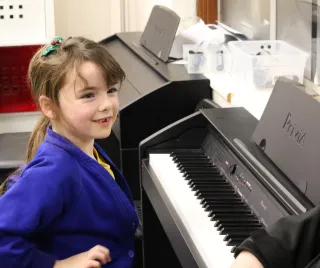
Why are Jungle Music classes split- up by age group?
The Jungle Music Courses have been developed by Early Childhood Specialist, Movement Specialists, and Musicians. The activities are age specific and age appropriate based on what your child can typically do at the age group. We also find that if a child is much older than another, they can tend to dominate simply because of their physical size.
The age groups for the different classes are:
Jungle Music Babies – 6 months to 18 months
Jungle Music Friends – 2.5 to 3.5 years
We do closely monitor your child’s development through the program, and there are occasions when children move up to the next age-group a few months early.
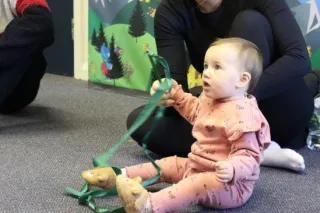
Parents in Class and Siblings in Class
For children in our Jungle Music, Music is Fun, Junior Keys and Piano Keys Classes we require the Parent to be in the class and become involved in the activities. We find effective learning occurs when you show a real interest in your child’s lessons. Participating in class will also mean you can help your child when they practice.
Because children in Private Lessons are often 8 years or older, they already have experience learning without you being in the class. So even though Parents are welcome to accompany their child to the lessons, they can wait in the reception area. We do ask that you are around at the end of the lessons as your child's teacher will like to have a quick chat to fill you in on the week's progress and what the focus will be on for the following week.
Older and younger siblings in class
It is recommended that older/younger siblings are not in the class with your child who is enrolled to learn. Siblings can often interfere with your child’s learning in class. Class number are also limited to 8, and with siblings (particularly those who then want to become a part of the lesson) in the class increasing that number can also have a negative impact on the learning of the rest of the children.
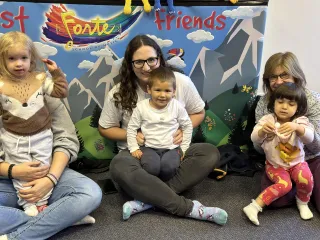
Trial Music Lessons
We understand just how important it is for a student to connect with and like their teacher, no matter the age. To address this right at the beginning, we offer Free Trials for all our Classes, and Discounted Trials for all our Private Lessons. The Trials allow you to see the school, meet the teacher, experience a lesson, to help you determine if we are the right school for you.
If for some reason, you or your child don't quite 'gel' with your teacher please do let us know. We're sure to have someone just right for you! That's the beauty of coming to Forte School of Music!
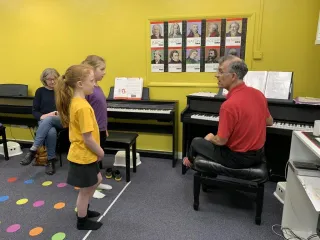
Do I need an instrument of my own for my trial lesson?
For your Trial Lesson, there's no need to have an instrument. Once you start your lesson you will have to practice, so you're going to need to have your own instrument.
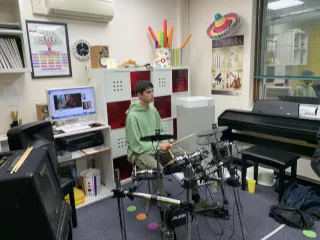
Classes and Curriculum
Do your classes follow a specific curriculum or lesson structure?
Yes, All of our Forte Courses an accompanied by high quality course material developed by early childhood specialist, movement specialists and musicians. Each course follows are series of lesson plans that are designed to teach children the fundamental aspects of music.
For our Private Students we follow a structure Goal Setting and Customised Lesson Planning approach to ensure the student’s musical development targets are achieved.
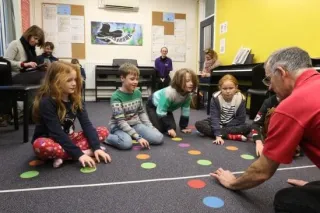
Goals and Objectives
Jungle Music and Music is Fun!
For our Jungle Music and Music is Fun Classes, it’s all about teaching the foundations of music. Through a diverse range of music and games, we introduce:
- Pitch – High and Low sounds
- Beat – Developing the feel for the steady pulse that runs through all music.
- Tempo – Fast and SlowTimbre – Sound texture, various types of sounds, e.g. wooden sounds of sticks, or the jingle of metal sounds.
- Form – The structure and patterns that exist within music
- Rhythm – The sequence and patterns that include sounds and silence
- Metre – Waltz, march, skipping
- Dynamics – Soft and loud
Piano Classes we add:
- Reading - notes and rhythm
- Aural skills - by ear recognition of notes and phrases. This essential musical skill is often overlooked especially in private lessons where it is difficult to teach on a one to one basis. Music is a aural art and a well trained ear is essential to becoming a competent musician.
- Keyboard Harmony - your child will learn to play chords that form the underlying basis or harmony of music. Chord playing assist in developing skills such as transposition, composition, improvisation and playing by memory.
- Pattern recognition - music is built using patterns. Your child is taught to recognise musical patterns and this aids in memorisation.
- Transposing - is playing known pieces in other keys or positions on the piano. From the early stages your child will transpose.Playing the music rather than only what is exactly written on the page. We encourage our students to play the music not the just the notes. eg if the piece is jazzy then we play it with the rhythms of the jazzy style. In the beginning this concept is as simple as what we play with the right hand we play with the left hand even though it is not written out!
- Theory - recognition and writing of musical notes and symbols
- Ensemble playing
- Performance opportunities
For our private lessons we:
- Learning to play the instrument, not just learning to play songs.
- Aural skills - by ear recognition of notes and phrases.
- Reading - notes and rhythm
- Pattern recognition - music is built using patterns. Your child is taught to recognise musical patterns and this aids in memorisation. - - -- Theory - recognition and writing of musical notes and symbols
- Ensemble playing
- Performance opportunities
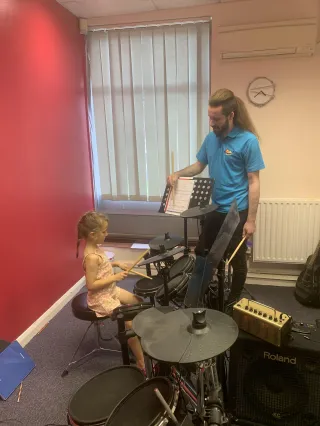
Why Learn Music?
Music is an effective medium to help develop a child's character and impart social learning. Enrolling them in music classes at an early age can help them become more aware of their surroundings and develop essential life skills
How does learning music affect the brain?
Learning music has been shown to have a variety of positive effects on the brain, including:
Increased brain connectivity: Learning and practicing music can improve the communication between different regions of the brain, which can enhance overall cognitive function.
Improved memory: Studies have shown that learning music can improve memory and the ability to retain and recall information.
Enhanced motor skills: Playing music requires fine motor skills, which can be improved through practice. This can have positive effects on other areas of life that require coordination and dexterity.
Reduced stress and anxiety: Playing music has been shown to have a calming effect on the brain, which can help reduce stress and anxiety levels.
Boosted creativity: Learning music can help stimulate creativity and encourage the development of new ideas.
Improved language skills: Learning music has been linked to improvements in language skills, including speech perception and the ability to process language.
Overall, learning music can have a range of positive effects on the brain and may have long-term benefits for cognitive function and overall well-being.
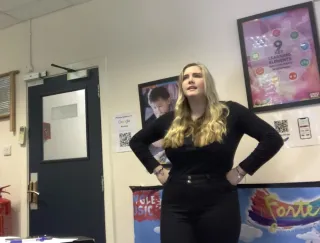
What are the health benefits of music?
Music has a variety of health benefits, both physical and mental. Here are some of the ways that music can be good for your health:
Reduces stress and anxiety: Listening to calming music can help to reduce stress and anxiety levels. It can also slow down your heart rate and breathing, which can help you to feel more relaxed.
Improves mood: Music can be a great mood booster. It can increase the production of dopamine, a neurotransmitter that is associated with pleasure and happiness.
Boosts memory and cognitive function: Studies have shown that music can improve memory and cognitive function, particularly in older adults. Listening to music can also help to improve focus and concentration.
Enhances physical performance: Listening to music while exercising can help to increase endurance and performance. It can also help to distract you from feelings of fatigue and discomfort.
Reduces pain: Listening to music has been shown to reduce pain levels in a variety of settings, including during medical procedures and after surgery.
Improves sleep: Listening to calming music before bedtime can help to promote relaxation and improve sleep quality.
Provides social connection: Music can be a great way to connect with others and build social bonds. Playing music with others can also improve communication and teamwork skills.
Overall, music can be a powerful tool for improving both physical and mental health. Whether you listen to music for relaxation, exercise, or social connection, it can provide a range of benefits for your well-being.
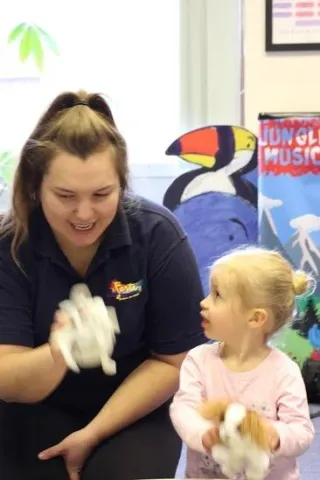
What are 5 benefits your child receives from playing a musical instruments?
Helps build perseverance
Learning a new instrument is not easy and requires effort, and this helps build patience and perseverance. Musicians don’t have it easy and have to endure long practice sessions to perfect their art. Even children while learning to play the right note, build patience which helps them later on in life.
Builds Co-ordination
Music requires hand-eye coordination. A musician is not only playing an instrument but also learning to read the musical notes. Adding breathing and rhythm to the mix takes it to another level of difficulty. However, with time and practice, as musicians learn, they are able to develop their coordination skills, enhancing their ability to effectively manage different tasks at the same time.
Helps social development
Learning to play a musical instrument from a music school provides an opportunity for children to develop their social skills as they learn to interact and engage with others their age. Later in life, such children find it easier to join a band or orchestra and form long term friendships with people.
Instils discipline
Learning a new instrument instils discipline in children as they learn to manage their school and extracurricular activities together. Moreover, it helps enhance concentration as children learn to identify tempo, rhythm, and quality of sound. You learn to hear the notes and others as well when playing in a group to maintain harmony. It develops team skills helping children to understand their peers and work together later in group assignments.
Enhances listening skills
When learning to play an instrument, you have to learn to listen as well. If you're playing a wrong note, you have to know and correct yourself. You can't rectify the fault without having identified it.
Music teaches children many different skills critical to their growth and development. The earlier you enrol your child in music lessons, the greater it benefits by enhancing their learning capabilities. Knowing how to play an instrument is a skill that helps enhance quality of life. Forte School of Music offers music lessons for children of all ages.
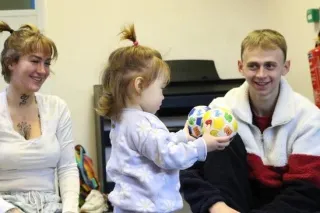
How does music help my baby and toddler develop and learn?
At Forte we follow 9 Key Elements of child development, these 9 key elements represent the most important senses and skills that must be cultivated for your child to reach their full potential. A baby and toddlers brain requires sensory input in order to build and develop. Music acts as an auditory stimulation that helps aid the 9 elements.
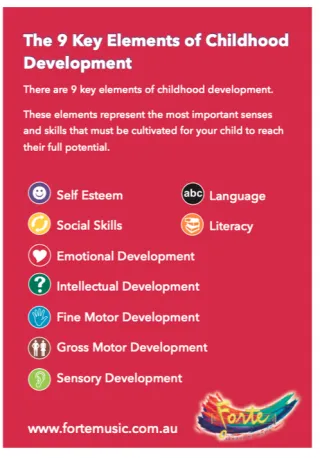
Motivating a child to Learn Music
How do I motivate my child to practice?
Motivating children to practice can be a challenging task, but there are some strategies that can be effective. Here are some tips to help motivate your child to practice:
Set realistic goals: Work with your child to set realistic goals for what they want to achieve through their practice. Encourage them to break down larger goals into smaller, achievable steps, and celebrate their progress along the way.
Make it fun: Try to make practicing a fun activity. Incorporate games, rewards, or other fun activities that your child enjoys. This can help make the practice feel less like a chore and more like a fun activity.
Provide positive feedback: Offer positive feedback and praise for your child's efforts and progress. This can help boost their confidence and encourage them to continue practicing.
Create a routine: Establish a regular practice routine that your child can follow. This can help make practicing a habit and reduce the resistance to starting.
Be involved: Take an active interest in your child's practice. Attend their performances or recitals, offer support, and show that you are invested in their progress.
Lead by example: If you are a musician or have experience with practicing, share your own experiences and practice habits with your child. This can help them understand the importance of practice and the benefits that come with consistent effort.
Remember, it's important to be patient and supportive as your child works to develop their skills. With the right motivation and encouragement, your child can make significant progress in their practice.

Do the students have the opportunity to perform?
Yes, we have two recitals a year, one in the summer term and one at Christmas. It’s a safe and nurturing environment where the aim is for the performer to have a positive experience.

Grades and Exams
At Forte Music School the students also have the opportunity to take the music exams. These can be take on an instrument as well as in music theory. The exam bodies available are as follows:
ABRSM
Piano - Classical
Music Theory
Singing
Musical Theatre
Strings - Cello/ Violin
MTB
Music Theory
Strings - Cello/ Violin
Guitar
Piano - Classical/ Jazz
Singing
Contemporary Singing
Drums
LAMDA
Musical Theatre (Voice)

Practice Rewards
Every child that is enrolled in a Music is Fun Class or higher, and every child that is enrolled in Private lessons is provided with a ‘Rewards’ card. Every time the child attends a lesson, the card is presented to the teacher who places a sticker on the card. The child can then start to exchange their stickers with various items in our Rewards Cabinet.
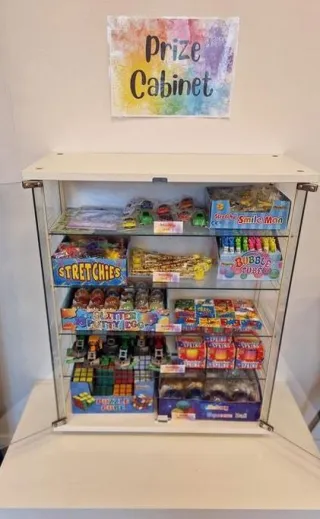
Enrolment and Invoicing
How and When do I Enrol?
On arrival of you first lesson you will be asked to fill out an Enrolment form, if you decide after your first lesson you would like to continue you details will be added to the system and you will be automatically enrolled. If however you don't want to follow up and continue lessons the forms are all destroyed and none of your details will be shared.
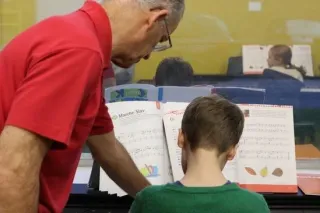
How do I pay for my Lessons?
Lessons can be paid for termly invoice sent to you or paid by a monthly direct debit, this can be set up or canceled at any time.
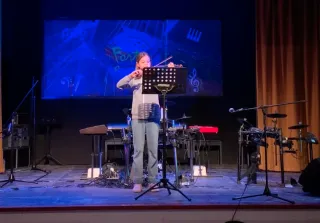
Attendance and Missed Lessons
What happens if we miss a Lesson?
It would be appreciated it if you let Forte know if you are going to be absent from lessons. Please tell reception or leave a message on 01622 910 010.
If you are absent from a class:
You will be able to attend another class at a similar level, if such a class exists.
A homework sheet will be sent to you to show you what to practice for the next lesson.
In cases where the teacher feels that a child may be falling behind, catch up lesson will be arranged by the teacher, at a mutually convenient time, at no extra cost.
There is no refund or credit for lessons missed.

What if my teacher cancels my lesson?
Teacher Absent
If the Forte teacher is absent:
Forte will, where possible, get a replacement teacher.
If we are unable to arrange a replacement teacher then your teacher will reschedule the lesson at a convenient time.
If you cannot make the rescheduled lesson, you will be eligible for a refund of the lesson cost.
Forte may cancel lessons at any time before the pupil commences for any reason whatsoever. Forte shall not be liable for any loss or damage arising from such cancellation. In the event of cancellation by Forte prior to the commencement of lessons, Forte will refund any fees already paid.

T&C's

Contact us:
Call:
01622 234634
Email:
Forte School of Music
Hopsack House
Pattenden Lane
Marden, Kent
TN12 9QJ

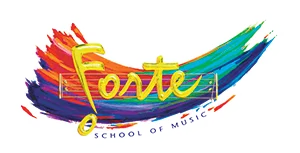
Book Your Taster Class/Lesson!
